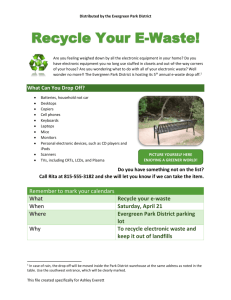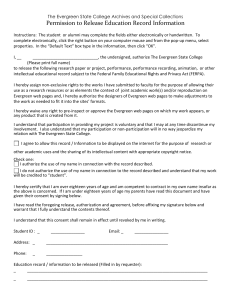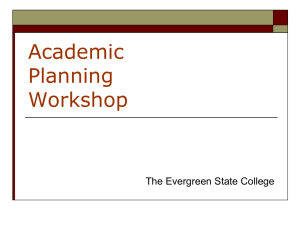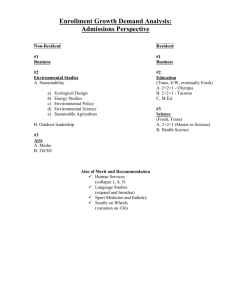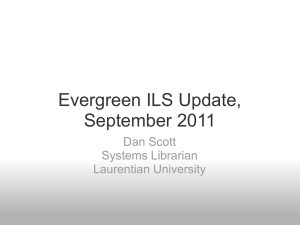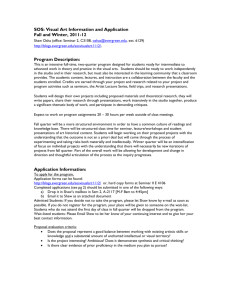Evergreen Crisis Shelter Wellness Policy
advertisement
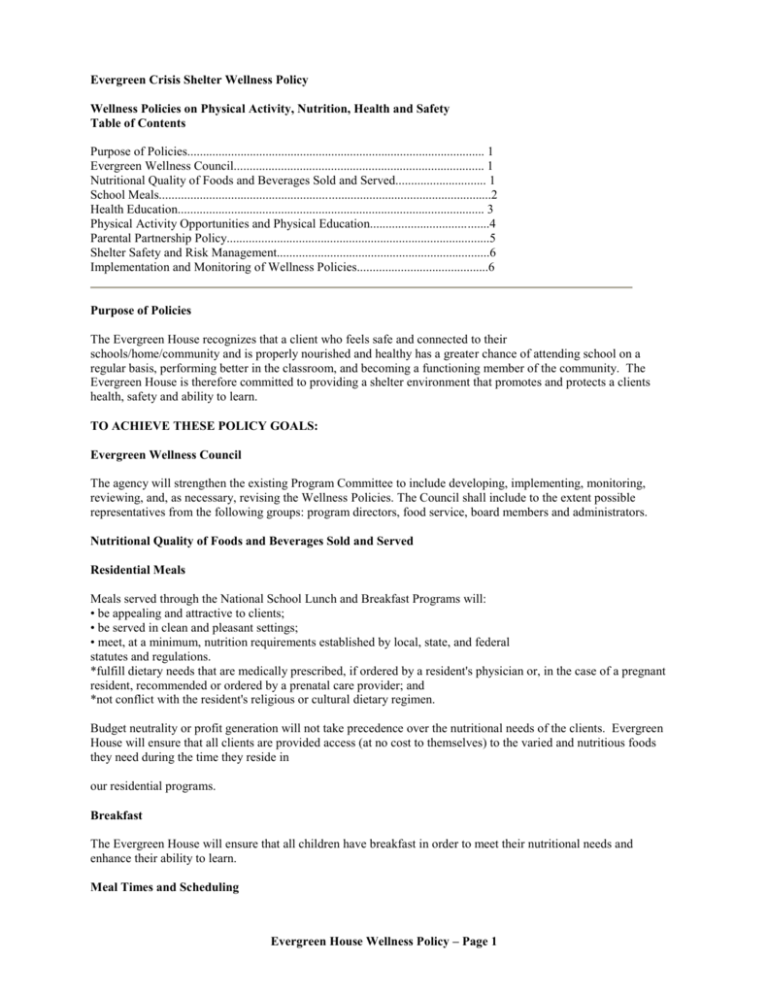
Evergreen Crisis Shelter Wellness Policy Wellness Policies on Physical Activity, Nutrition, Health and Safety Table of Contents Purpose of Policies............................................................................................... 1 Evergreen Wellness Council................................................................................ 1 Nutritional Quality of Foods and Beverages Sold and Served............................. 1 School Meals..........................................................................................................2 Health Education.................................................................................................. 3 Physical Activity Opportunities and Physical Education......................................4 Parental Partnership Policy....................................................................................5 Shelter Safety and Risk Management....................................................................6 Implementation and Monitoring of Wellness Policies..........................................6 Purpose of Policies The Evergreen House recognizes that a client who feels safe and connected to their schools/home/community and is properly nourished and healthy has a greater chance of attending school on a regular basis, performing better in the classroom, and becoming a functioning member of the community. The Evergreen House is therefore committed to providing a shelter environment that promotes and protects a clients health, safety and ability to learn. TO ACHIEVE THESE POLICY GOALS: Evergreen Wellness Council The agency will strengthen the existing Program Committee to include developing, implementing, monitoring, reviewing, and, as necessary, revising the Wellness Policies. The Council shall include to the extent possible representatives from the following groups: program directors, food service, board members and administrators. Nutritional Quality of Foods and Beverages Sold and Served Residential Meals Meals served through the National School Lunch and Breakfast Programs will: • be appealing and attractive to clients; • be served in clean and pleasant settings; • meet, at a minimum, nutrition requirements established by local, state, and federal statutes and regulations. *fulfill dietary needs that are medically prescribed, if ordered by a resident's physician or, in the case of a pregnant resident, recommended or ordered by a prenatal care provider; and *not conflict with the resident's religious or cultural dietary regimen. Budget neutrality or profit generation will not take precedence over the nutritional needs of the clients. Evergreen House will ensure that all clients are provided access (at no cost to themselves) to the varied and nutritious foods they need during the time they reside in our residential programs. Breakfast The Evergreen House will ensure that all children have breakfast in order to meet their nutritional needs and enhance their ability to learn. Meal Times and Scheduling Evergreen House Wellness Policy – Page 1 Evergreen House: • Breakfast will be available in the mornings from about 6:30am to 9:00am. Lunch is served from 12:00pm until about 12:30. The kitchen is typically cleaned and closed at 1:00pm. School snacks are served about 4:00pm on school days. • should not schedule meetings or activities during mealtimes, unless clients may eat during such activities; • will provide clients access to hand washing or hand sanitizing before they eat meals or snacks. Food and Beverages Sold Individually Currently, clients are not allowed to purchase soda pop during school hours. Water is always available. Snacks Most snacks served during the school day or in after-school programs will make a positive contribution to children's diets and health, with an emphasis on serving fruits and vegetables as the primary snacks and water and fruit juice as the primary beverage. Rewards The agency will not use foods or beverages that comprise standard daily meals, especially those that are not nutritious, as rewards for academic performance or good behavior, and will not withhold food or beverages (including food served through school meals) as a punishment. Celebrations Celebrations that involve food during the school day will be encouraged to include some healthy foods or beverages. Health Education The Evergreen House is not a school and does not offer formal Health Education to youth served through our residential programs. However, the Evergreen House will support fully all health education goals for children/youth provided through their school. Evergreen House will also support students participation in school programs designed to promote healthful living and discourage health-risk behaviors shall be offered in group to encourage clients to follow healthier diets. Evergreen House will support children/youth served (through homework assistance, ideas, and resources for school projects) in meeting educational goals so that they develop and acquire the skills and information to: • comprehend concepts related to health promotion and disease prevention; • access valid health information and health-promoting products and services; • practice health-enhancing behaviors and reduce health risks; • analyze the influence of culture, media, technology, and other factors on health; • use interpersonal communication skills to enhance health; • use goal-setting, decision-making, and self-management skills to enhance health; and • advocate for personal, family, and community health. Instructional Program Design The Evergreen House will support the Instructional Program Designed offered by each child/youth’s school to: 1. utilize educational theories and methods that have credible evidence of effectiveness; 2. emphasize learning and practicing the skills clients need for healthful living; 3. build functional knowledge and skills from year to year (i.e., be sequential in design); 4. include accurate and up-to-date information; 5. use active, participatory instructional strategies and techniques; 6. be appropriate to clients' developmental levels, personal behaviors, and cultural backgrounds; 7. focus on the behaviors that have the greatest effect on a person's health and emphasize the short-term and long-term consequences of personal health behaviors; 8. encourage clients to assess their personal behaviors and habits, set goals for improvement, and resist peer and wider social pressures to make unhealthy choices; 9. stress the appealing aspects of living a healthy lifestyle; 10. address clients' health-related concerns. Evergreen House Wellness Policy – Page 2 Staff Wellness Evergreen House highly values the health and well-being of every staff member and will plan and implement activities and policies that support personal efforts by staff to maintain a healthy lifestyle. Physical Activity Opportunities and Physical Education Daily Physical Education 3-12 All clients in grades 3-12 shall participate in 150 minutes of physical activity per week that includes all on ground and off grounds activities . Instructional Program Design The Evergreen House is not a school and does not offer formal Physical Education to youth served through our residential programs. The Evergreen House shall strive to support each youth served in meeting learning goals and objectives for physical education provided through the child’s school to include: 1. emphasize knowledge and skills for a lifetime of regular physical activity; 2. be consistent with Minnesota's standards for physical education and the school's Curriculum Framework that define what students should know and be able to do; 3. devote at least 50 percent of PE class time to actual physical activity, with as much time as possible spent in moderate to vigorous physical activity; 4. provide many different physical activity choices 5. feature cooperative as well as competitive games 6. meet the needs of all students, especially those who are not athletically gifted 7. take into account gender and cultural differences in students' interests 8. teach self-management skills as well as movement skills 9. actively teach cooperation, fair play, and responsible participation in physical activity; and 10. be an enjoyable experience for students. The Evergreen House shall commit to meeting the physical activity standards below. Staff shall aim to develop students' self-confidence and maintain a safe psychological environment free of embarrassment, humiliation, shaming, taunting, or harassment of any kind. In addition, suitably adapted physical activities shall be available to all youth who have shelter stays who are unable to participate in regularly scheduled physical activities due to disability or physical or social functioning. Adequate Facilities Agency leaders shall endeavor to ensure the cost-efficient provision of adequate spaces, facilities, equipment, supplies, and operational budgets that are necessary to achieve the objectives of the physical activity program. Physical Activity Opportunities After School The Evergreen House will explore how to offer at least one extracurricular physical activity programs each season that provides moderate to vigorous physical activity for all participants. Physical Activity and Punishment Teachers and other school and community personnel will not use physical activity (e.g., running laps, pushups) or withhold opportunities for physical activity (e.g. recess, physical education) as punishment. Parental Partnership Policy The Evergreen House recognizes that parents and families are a child's first and most important teachers. When children enter Evergreen programs, the responsibility for their learning is shared by the Evergreen House schools, families, communities, and the children themselves. Further, Evergreen House believes that all children deserve to grow up in nurturing, healthy, and safe learning environments in which families are supported in their roles and responsibilities; families of all cultures and incomes care deeply about their children's success; and family-schoolcommunity collaboration and partnerships benefit all children. It is the goal of the Evergreen House to "develop strong partnerships with the home". Parents and community agencies working as partners increase student achievement, promote health, and develop positive attitudes about self Evergreen House Wellness Policy – Page 3 and school. The key factor in the home-community partnership is the relationship between the teacher and the parent. Organizational support from the board and administration enables counselors to effectively develop the partnership. The intent of this policy is to result in consciously doing those things already in practice in a more efficient, consistent, and effective manner as well as generating new ways of strengthening the partnership. The partnership between home and school will be supported by the development of a committee of parents and staff that will continually assess, plan and implement strategies that build the home and school partnership including: 1. Assuring that the infrastructure supports counselor's efforts to communicate with parents. 2. Assessing parental involvement. a. Communication between home and Evergreen is regular, two-way, and meaningful, b. Teaching responsible parenting. c. Evergreen staff, Families and the community play a key role in helping students learn. Evergreen counselors provide a welcoming environment for parents and clients community members and seek their support, d. Parents participate in advocacy and decisions, regarding their child. Community resources are made available to family members and youth. 3. Providing resources to staff and parents that aid in parent-staff communication and collaboration. Facility Safety and Risk Management See section 9 Emergency procedures of the Program Manual. Implementation and Monitoring of Wellness Policies The facility’s Program Director will ensure compliance with established nutrition and physical activity wellness policies. The facility will follow all the nutritional guidelines and recommendations made by the Food and Nutrition Service of the MN Department of Education. Summaries of our meals, including ingredients, and the number of youth served will be submitted as required. The Minnesota Department of Education will monitor the quality of our menus on a timely basis. The facility’s food processing and food storage procedures will be monitored annually by the MN Department of Health in accordance with the facility’s food and lodging license. Site safety, hygiene, and health will meet all standards required by the MN Dept. of Health. Compliance will be monitored by the Department of Health. The Program Director will be responsible to monitor progress on these policies. Menus will be monitored daily to ensure compliance with nutritional requirements. The staff involved in food preparation will receive timely training in safe food handling procedures. The facility will partner with all the relevant State agencies to ensure that clients health needs are being met. The agency Human Resources Director will facilitate training on all OSHA and safetyrelated concerns. Evergreen House Wellness Policy – Page 4
